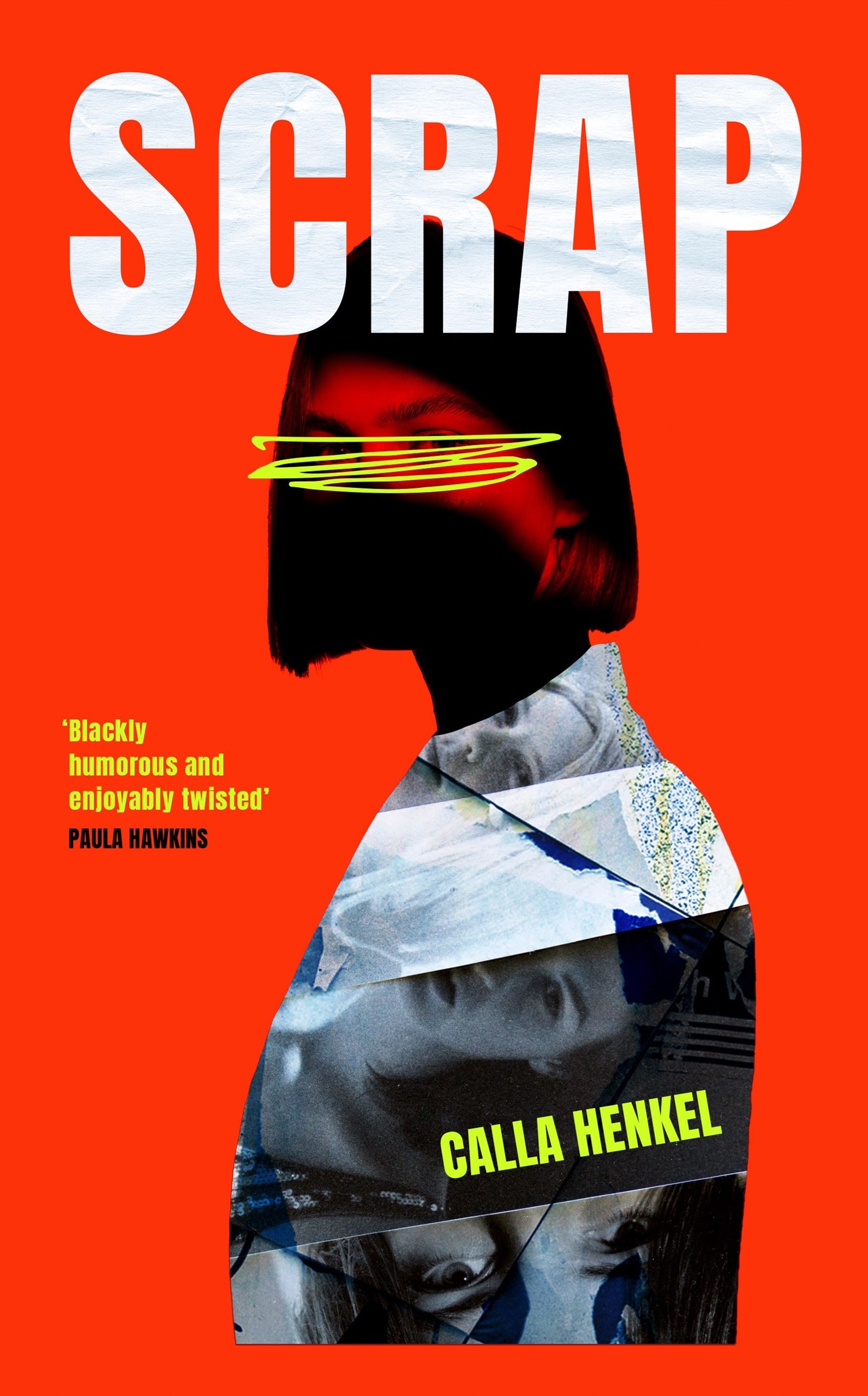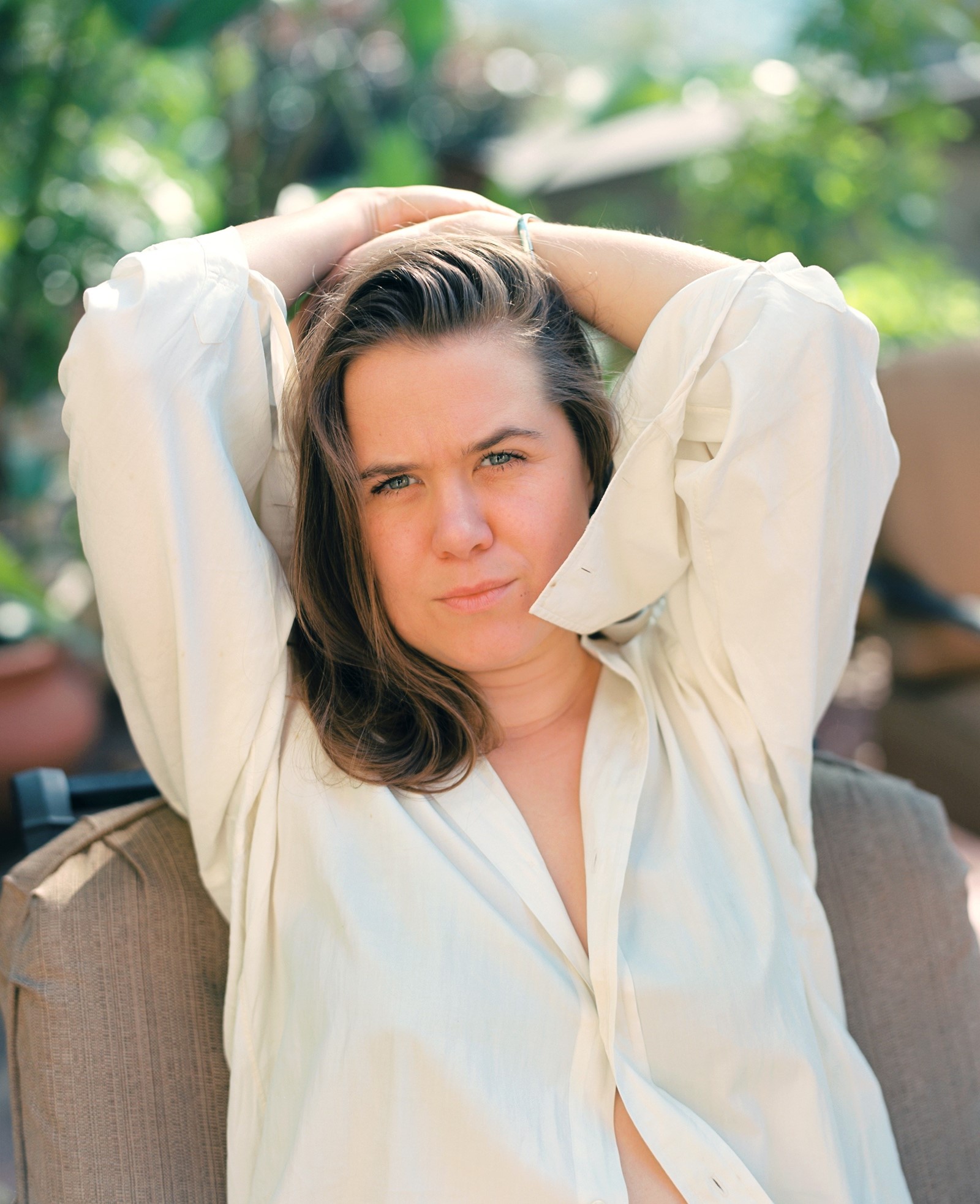Being an artist, playwright, director, theatre owner and occasional bartender to a community of artists and friends wasn’t enough for Calla Henkel – she wanted to become an accomplished novelist too. Known for her collaborative artistic work with Max Pitegoff, Henkel spent years in the Berlin art scene running venues and writing and producing plays with Pitegoff, only to become ‘drained’ by alternative theatre, which led her to write and publish her debut novel, Other People’s Clothes, to critical acclaim.
Other People’s Clothes mixed Henkel’s own life story as an American art student on exchange in Berlin with the conventions of a literary thriller, making Henkel an artist who could shift seamlessly between writing critical theatre to accessible, binge-worthy ‘airport novels’, as she likes to call them. Although her latest book Scrap also loosely mirrors an experience she herself once lived, Henkel says that the main protagonist is not like her; rather, the character is someone who is navigating “constant levels of dissatisfaction”.
By using her own experiences in her books, Henkel has created exceptionally nuanced and flawed characters who, despite existing solely in her mysteriously thrilling plotlines, experience the obsessive and unhealthy relationships we all try to navigate in our lives. In doing so, Henkel paints a perfectly fractured portrait of the chaos that lives within our minds.
Below, AnOther spoke with Calla Henkel about writing Scrap.

Jodie Hill: What compelled you to write a novel in the first place?
Calla Henkel: Max [Pitegoff] and I were at the Volksbühne in Berlin running the Grüner Salon. We wrote four plays in one year and then staged performances by different artists every weekend. I think I was very burnt out from theatre. It was so draining, and German theatre on that level was so extreme; the politics of the house were really insane ... I was just like, “I’m done.”
We were writing these plays that dealt with the politics of Rosa-Luxemburg-Platz. It felt very niche – the plays were half in German, half in English. I felt like I was writing for 25 people. I wanted to write something that anyone could read, like an airport novel, and take all of these thoughts about performance and my own work and put them in a format which was really accessible and pop. I started writing about how I got to Berlin and then it transformed. I didn’t have the story planned out, I never do that. I like to be surprised.
JH: Why thrillers?
CH: I have this true belief that thrillers provide an extreme motor, and you can throw anything at it. They could be set in the weirdest place or related to botany, science, whatever and we’d be like, “Yes, totally!” as long as there’s this motor pushing you through the story. So you can be very specific in detail when the motor of the story is so strong, and there is this life-or-death propulsion through it. In that way, I feel like the form of a thriller and the mystery has allowed me to make the niche-ness feel open and plausible.
JH: So the thriller acts as a portal?
CH: Totally. If I were to write a maths thesis, I would be like, “OK, and then there was a murderer.” We have this hook in us. I think that the second book is about this, where you just want to fucking know at any cost. And that cost might be learning about the art world or botany or whatever. I really believe in high-low and in making forms that are trashy, but giving them everything, all this very real pain and grief. It’s funny, when I was first putting out the thriller, my publisher was like “Don’t say the word thriller.” There’s a level of trash to it which I think I’m attracted to, especially after doing theatre, or fine art, which might be considered a “higher plane”.
“I wanted to write something that anyone could read, like an airport novel, and take all of these thoughts about performance and my own work and put them in a format which was really accessible and pop” – Calla Henkel
JH: How does your performance work thematically impact your writing?
CH: Max and I are always interested in the line between what is private and what is public; or when one is performing or when one isn’t. We did a photo series where we asked artists to show us their receipts from their art production; it worked as a sort of inverse audit, where the receipts for Prada shoes bought for the opening lay next to the raw material receipts for the sculptures. I guess it’s a question of where the labour starts and stops. The novels are also deeply linked to my practice. In a funny way, they are the perfect form to bring together ideas of performance, labour, documentation and photography, which are at the core of my work with Max.
JH: The art critic Isabelle Graw recently published a book, On the Benefits of Friendship, about what she called ‘utility friendships’ in the art world, which I would say heavily exist in your protagonists’ social worlds.
CH: Yes, I just read Isabelle’s book. I think friendship is always about pushing each other. Like creating social loops with people, and then seeing how far you can take it. I’m working with the director Leilah Weinraub on a play at the New Theatre, and we keep coming back to the idea of exploitation within friendship and how it feels like this drumbeat within the art industry.
JH: And what about the obsessions your characters develop towards other females?
CH: As a writer or artist, there’s always that thing you go back to that’s kind of your anchor interest. I’m interested in this strange belief that questions in life can be solved by consuming someone else. In Other People’s Clothes, it’s very clear that this toxic exchange between two friends plays out how friendships do at that age, when you’re sort of testing things out and mirroring each other. But in Scrap, it’s constant levels of dissatisfaction, and not wanting to see yourself in other people, and at the same time, wanting to be really close to them. Esther can’t be close to people but it’s all she wants. She can’t have healthy relationships so instead she consumes them, becomes them.
[On LA] “I’ve never lived in a place that has so much desperation. It’s really crazy” – Calla Henkel
JH: Do you share any qualities with Esther’s character?
CH: She is not me at all. I always joke that I have characters in my brain smoking a cigarette in a bar, waiting for me to finish their story. I’m really happy she’s not in my brain anymore, because she’s just so acerbic. Maybe there’s a part of me that’s really dark but I didn’t drop out of the art world. I had friends at one point who did and who sat around being angry. But the genesis of the story is that, many years ago, I was hired by a friend of mine to make scrapbooks of her family, and she did store all this stuff. We went out to dinner years later and she said “Don’t you think the scrapbooks would make a good next book?” and I was sort of like, “That’s nuts, you’re out of your mind.” A week later, I thought, “Oh my god, it’s such a good setup and so creepy”. So that was how I came up with the story, and then I thought, “What would be the scariest type of person to enter your personal everything?” It would be someone like Esther.
JH: You and Max recently opened the New Theatre in Hollywood. Was Esther’s character influenced by your experiences living in LA?
CH: I wrote this book when I was still in Berlin, but I’m obsessed with LA, and I feel like a lot of Esther exists here. Because in every interaction, there’s this flicker between people: “Maybe this is going to be my big break.” I’ve never lived in a place that has so much desperation. It’s really crazy. Berlin is like the opposite, where it’s rude to be in a good mood. Here, you have to be like, “I’m amazing. And my projects are going really well.” It took me months to reset my brain. There’s this different energy here, but again, a lot of it is rooted in this kind of desperation and it’s weird. The only democratic spaces of exchange are the post office and the gas station. Everything else feels so weirdly ticketed. Even a dinner party feels ticketed. You don’t roll into a bar and have a night, it’s like everything is pre-planned and so I feel like people prepare for their interactions with each other. And then when you finally have some actual unbridled [interactions] – it’s just chaos.
JH: What are you working on next?
CH: Max and I have a full schedule of plays at the New Theatre. We have one play a month for the next year lined up. I’m working on a third book called For Terrible Parents, which is also a thriller; it’s about two queer couples who decide to raise a kid together and then the kid goes missing. I had to take a pause from writing it because it’s also partly based on reality and it got emotionally complicated, but now I feel ready again.
Scrap by Calla Henkel is published by Sceptre, and is out now.
